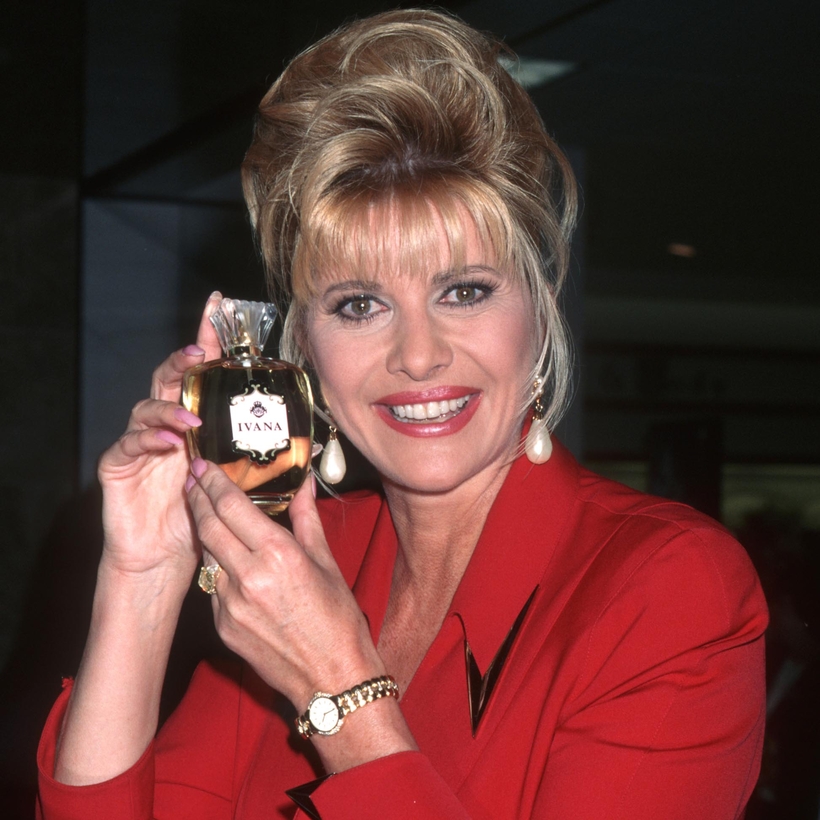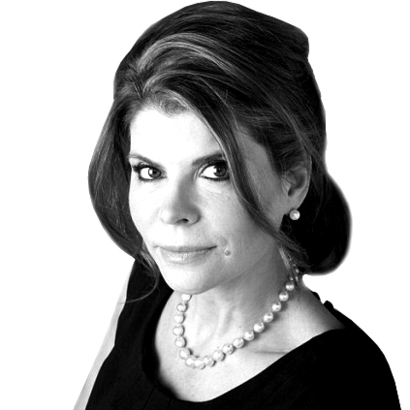Ivana is not a common name. Growing up in England, I was always the only Ivana. My mother liked Russian and Polish names, and so my sisters, Natalya and Evgenia, and I were always considered slightly exotic.
When I arrived in New York as a young aspiring actress—aspirations that were quickly dashed—it was the mid-80s. Enormous shoulder pads, bouffant hairdos, and showy displays of affluence were all the rage, and no other couple represented this “new” New York better than Ivana and Donald Trump.
When it came time to be seated at charity dinners and more intimate society gatherings, a pattern of icebreaking chatter began—a pattern that would soon wear thin. The fellow to my left would look at my name and say, “You are Ivana? Huh! I was expecting the other Ivana.” The fellow to my right would chime in, “Me too.”
Sometimes it would go in the other direction. I would plonk down on my chair, and the fellow to my left and the fellow to my right would express enormous relief that I was not Ivana Trump.
“You are Ivana? Huh! I was expecting the other Ivana.”
Not long after the infamous Donald and Ivana split, in 1990, I was still living in New York. My then boyfriend was assigned by The Sunday Times of London to write a profile of the newly divorced real-estate mogul Donald Trump and brought me with him. Trump wanted my boyfriend to see and write in glowing terms about his latest venture: the Trump Taj Mahal Hotel and Casino, in Atlantic City.
A black stretch limo picked us up to meet Trump, as he stood, improbable hair blowing in every direction, in front of a helicopter ostentatiously bearing his name. Once we were seated, he reacted strongly when first learning my name.
“Ivana! Are you kidding me?,” Trump exploded. “I just got rid of one, and now you’re telling me there is another one?”
Ivana: No 12 Steps or Group
Quite a few years and many experiences later, I was trying to overcome some difficulties. I had lost my mother to cancer, and I was trying to find a way, any way, to just not feel anything. Drinking had always been a prop and a solace, until it started to be neither.
My friends were worried, my family was worried, and I was worried, so when it was suggested I check in to a rehab facility in Malibu, I welcomed it with a lovely sense of relief. I thought that, for the next three or four weeks, at least I would be in good and safe hands with like-minded people.
I had heard scary stories about rehab: tough love, scrubbing toilets with toothbrushes, no connection to the outside world, and a lifelong commitment to A.A. meetings and bad coffee.
I was trepidatious and slightly panicky as my car drew up to a pink mansion at the top of a hill in Malibu. I thought that my life as I had known it was over, but I was willing to surrender to whatever rehabilitation meant.

My nerves quickly dissolved when I was introduced to my own personal-treatment therapist. Dressed in white linens and talking in a preternaturally quiet and soothing voice, he explained to me that this facility focused on a “wellness” approach to recovery. “We are not here to shame or blame but to understand and encourage your journey into discovering a better you,” he said.
Those words didn’t make much sense, but he then guided me up a white faux-marble staircase to a large room overlooking the ocean.
I had hidden my cell phone and expected to be stripped of all “contraband.” I had taken heed of the warnings from friends who had gone through tough rehab in places from Minnesota to Arizona. “They will take your cosmetics, your ‘sharps,’ and anything that can’t be locked down.”
“Ivana! Are you kidding me?,” Trump exploded. “I just got rid of one, and now you’re telling me there is another one?”
I needn’t have concerned myself. After I had settled into my room, contraband all intact, my therapist popped his head around the door and suggested I came to look at my program for the next three weeks.
Next to the open kitchen, where there was a chef doing all sorts of interesting things with wheatgrass, was a large whiteboard. Our schedules for the following day were all written in black marker.
Ivana:
9:00 Aromatherapy.
10:00 Group
11:30 Dr Schonfeld
As I was studying my agenda, I became aware of a commotion going on behind me.
When I turned around, a tall woman with almost equally tall blonde hair and a faceful of makeup was screaming, at whoever would listen to her.
“How many times do I have to tell you my name is not Ivana—it is Maria. I am Maria!”
When she calmed down, I turned around and introduced myself: “Hello, I’m Ivana.” She seemed confused at first, but then, as her anger subsided, her face began to soften.
“Ivana? You too are called Ivana?”
When the seemingly extraordinary coincidence finally registered, she smiled a huge lipsticked smile and said, “Darlink, you must tell me your story. Come and talk to me.” And, with that, an unlikely friendship began.
Ivana had checked into this “rehab” with many conditions attached. She was to stay with her much younger companion, “Roberto,” who I soon learned was also using an assumed name. Ivana did not feel it was necessary for her to attend group or 12-step meetings, and she was to be called “Maria” at all times. When I asked her why or what she was here for, she flashed another smile and said, “Exhaustion, darlink, pure exhaustion.”
There is an old and well-trodden saying about rehab and A.A.: “No one gets here by accident.” And, as the long days progressed, Maria/Ivana became an integral part of our group. She began to open up. She talked honestly, candidly, and at great length about the abusive marriage she had been in, how much she had suffered at the hands of this man, and how much she hated him. (Despite her vitriol at the time, she and her ex-husband would remain amical until her death last week.) Nobody in our group knew or cared who her ex-husband was—we were all there for our own ugly reasons—but the less we cared, the more she wanted to share.
Roberto and Ivana never adhered to the daily schedules imposed upon the rest of us. They would take off for a lunch with friends in Malibu or a shopping spree in Santa Barbara. I would gaze out of the window of my therapist’s office, bored rigid from having to retell stories of childhood trauma, only to see Ivana and Roberto pull up in their red convertible.
Ivana would be laughing as she fished out endless shopping bags from the back seat of the car, and I could hear her still laughing as her high heels clipped up the staircase.
One morning toward the end of my stay, just as I was trying to not gag on the chef’s wheatgrass-juice special, Ivana appeared and put her arms around my shoulders. “Darlink, tonight is going to be my treat. I am taking us all out to dinner. There is a fabulous restaurant right on the water, and the food is divine. I think we all deserve a treat, don’t you?”
I nodded and said that we probably did but added that we were still in rehab and that I wasn’t sure if going out to dinner was part of the rehab program. Ivana waved off my concerns with a toss of her hands: “No problem! I have taken care of everything.”
She talked honestly, candidly, and at great length about the abusive marriage she had been in, how much she had suffered at the hands of this man, and how much she hated him.
At five p.m. that evening, a selected few from our group, including me, were picked up by the van our rehab used to transport “clients” back and forth from the airport, and were taken down to a restaurant that was indeed on the water. Ivana and Roberto were already seated. She had had her hair done in an immaculate version of a beehive and was wearing a low-cut and clingy blue dress.
We had a chaperone from rehab, whose job was meant to be one of monitoring and safeguarding all the “clients.” Somehow, Ivana made him disappear. No menus were offered, but, nevertheless, the table was quickly filled with a variety of small plates full of tasty appetizers, and we tucked in with appreciative gusto.
As we were reaching the end of our amuse-bouche, a waiter appeared with a bottle of champagne, and we all were given crystal flutes. The waiter poured Ivana a glass. She raised it toward us, and then, with a flourish, signaled to the waiter to fill all our glasses.
I looked at my fellow “inmates,” as we liked to call ourselves, and we all seemed to have the same reaction: shocked, bemused, and, of course, tempted. For the past three weeks, we had spilled our souls out. Discussed and shared our most intimate fears and thoughts. And we had done it all sober. It didn’t matter what your “thing” was—when you were in our rehab bubble, you were cosseted and safe from whatever demons may be lurking on the outside.
Suddenly the flute of champagne seemed to represent everything that we most feared. Before anyone had a chance to reach for their glass, I stood up clumsily and said, “Look, I know how much we have all paid to be in treatment. If you touch that glass of champagne, it will be the most expensive drink you have ever had.” No one touched his or her flute.
Ivana was completely unfazed. I don’t think she even noticed the discomfort we all were feeling. She downed another glass, and, thankfully, our chaperone arrived soon after to take us back “home.”
The waiter poured Ivana a glass of champagne. She raised it toward us, and then, with a flourish, signaled to the waiter to fill all our glasses.
The following day, as I was about to go into my psychodrama class, Ivana stopped me. “Darlink, we are leaving today, but I want to give you something.” She opened her Hermès bag and pulled out a bottle of perfume. It was an elegant, heart-shaped bottle boldly labeled IVANA.
She gave me a little card with delicate handwriting: “With love from one Ivana to another.”
I still have the bottle of perfume, and I am sad she has gone. Who else is going to be the other Ivana?
Ivana Lowell is a writer whose memoir, Why Not Say What Happened?, is being adapted as a television series


